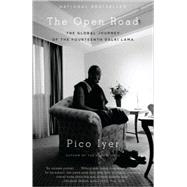
The Open Road The Global Journey of the Fourteenth Dalai Lama
by IYER, PICOBuy New
Rent Book
Used Book
We're Sorry
Sold Out
eBook
We're Sorry
Not Available
How Marketplace Works:
- This item is offered by an independent seller and not shipped from our warehouse
- Item details like edition and cover design may differ from our description; see seller's comments before ordering.
- Sellers much confirm and ship within two business days; otherwise, the order will be cancelled and refunded.
- Marketplace purchases cannot be returned to eCampus.com. Contact the seller directly for inquiries; if no response within two days, contact customer service.
- Additional shipping costs apply to Marketplace purchases. Review shipping costs at checkout.
Summary
Author Biography
Excerpts
The two young men had many things in common as they settled into the room under the snowcaps, bright Tibetan scrolls on the walls, pine-covered slopes all around. Both of them were travelers—exiles—who had left their homes behind and so were in a position to think about home in a new way, without the limitations of nationality or race. Both were philosophers, too, but philosophers with a keen interest in the real world and the ways in which politics and society could be transformed by being seen in a different light. Both were coming of age at a time when cultures could reach one another as never before, thanks to jet planes and television screens, and the first question before them, perhaps, was how to turn this global reality into a fresh opportunity.
The Fourteenth Dalai Lama was only twenty-four at the time, having come into India barely a year before, in March 1959, when Chinese troops had threatened to bring war to his capital of Lhasa and he had been forced to flee his native Tibet. Now, for the first time in his adult life, he was sharing a house with his mother and some siblings, relishing the chance to talk to strangers and come down from his throne as he could never have done in his old home. He loved to take walks in the high mountains in those early days, to picnic in meadows; he even started a garden as he had done in Lhasa. But every time he did, he later confessed, one of India’s notorious monsoons would sweep through, reducing all his efforts to nothing, and a part of him would miss the high, dry plateaus of Tibet.
My father, when he came into the room, was moving in the opposite direction. He had been born five years before the Dalai Lama, to Hindu parents, and had grown up in a tiny apartment in Bombay, shared with six siblings, some cousins, even the occasional neighbor. He had been trained in British Catholic schools and had so mastered the Shakespeare and Augustine they had taught him that he had won a scholarship to Oxford and now (like my Hindu, Bombay-raised mother, too) was teaching political philosophy in the ancient university. He had a rare chance, he knew, to bring the great Western tradition of Plato and Plotinus and Kant together with the Hinduism and Buddhism he had absorbed as a boy.
At the time he sailed back to India and requested a meeting with the newly arrived Dalai Lama, my father was deep in research on Mohandas Gandhi. The Tibetan leader had himself been thinking intensely about Gandhi, of course, as he tried to see how he could lead a nonviolent struggle against an occupying power and summon political sophistication in a transpolitical cause; by chance, the house in which he was staying had been lent him by the same wealthy Indian family that had lent Gandhi his final home, in Delhi, and pictures of the Indian activist of just a generation before filled the building in which the young men met. The subtitle Gandhi had chosen for his autobiography—The Story of My Experiments with Truth—might have applied to the Dalai Lama’s story, too (he was a practical and lifelong lover of experiments), as he tried to construct a new, more durable Tibet outside Tibet and to see how he could protect the rights of his people without denying the legitimate rights of their “great neighbor,” as he called it, Communist China.
Five years after that first meeting, my father brought out a book,The Glass Curtain, about the centuries of delusion and projection that had separated Asia from Europe. Its foreword was contributed by his new friend, the Dalai Lama, for whom cutting through differences to a deeper commonness was always a central goal. The book was dedicated—though it would take me decades to notice it—to a little boy called Pico and to “those of his generation for whom there will be no curtain.”
Forty-three years after that propitious encounter, one of its benef
Excerpted from The Open Road: The Global Journey of the Fourteenth Dalai Lama by Pico Iyer, Pico Iyer
All rights reserved by the original copyright owners. Excerpts are provided for display purposes only and may not be reproduced, reprinted or distributed without the written permission of the publisher.
An electronic version of this book is available through VitalSource.
This book is viewable on PC, Mac, iPhone, iPad, iPod Touch, and most smartphones.
By purchasing, you will be able to view this book online, as well as download it, for the chosen number of days.
Digital License
You are licensing a digital product for a set duration. Durations are set forth in the product description, with "Lifetime" typically meaning five (5) years of online access and permanent download to a supported device. All licenses are non-transferable.
More details can be found here.
A downloadable version of this book is available through the eCampus Reader or compatible Adobe readers.
Applications are available on iOS, Android, PC, Mac, and Windows Mobile platforms.
Please view the compatibility matrix prior to purchase.
